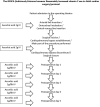Effect of Ascorbic Acid on Cardiac Surgery-Associated Acute Kidney Injury Incidence
- PMID: 35643076
- PMCID: PMC9556162
- DOI: 10.1055/s-0042-1744262
Effect of Ascorbic Acid on Cardiac Surgery-Associated Acute Kidney Injury Incidence
Abstract
Objectives: Acute kidney injury (AKI) is associated with higher perioperative mortality and morbidity. Oxidative stress has been proposed as a cause of postoperative AKI. Ascorbic acid (AA) supplementation was suggested as a novel and promising antioxidant. The aim of this study was to evaluate the capability of AA to reduce the incidence of postoperative AKI in cardiac surgery patients.
Methods: A prospective randomized trial was conducted in patients scheduled for on-pump cardiac surgery. Subjects in the AA group received 2 g of AA intravenously during the induction of anesthesia, 2 g before aortic cross-clamp removal and 1 g every 8 hours for five postoperative days (the JERICA protocol). Postoperatively, the patients were monitored for AKI and other complications. Malondialdehyde levels were monitored in a subpopulation of 100 patients to evaluate the effect of AA on oxidative stress level.
Results: The AA and control group consisted of 163 and 169 patients, respectively. The groups were well matched for baseline demographics and had similar intraoperative characteristics. The incidence of AKI in the AA and control group was 20.9 and 28.4%, respectively (p = 0.127). The estimated glomerular filtration rate did not differ between the study groups in the entire postoperative period. There was a trend toward higher malondialdehyde values with statistical significance on postoperative day 1 and lower in-hospital mortality in the AA group (0.6 vs. 4.1%, p = 0.067).
Conclusion: Our results do not support the effectiveness of AA supplementation in reducing the incidence of postoperative AKI in on-pump cardiac surgery patients.
Clinical registration number: This study was registered with the ISRCTN Registry under the trial registration number ISRCTN98572043.
The Author(s). This is an open access article published by Thieme under the terms of the Creative Commons Attribution-NonDerivative-NonCommercial License, permitting copying and reproduction so long as the original work is given appropriate credit. Contents may not be used for commercial purposes, or adapted, remixed, transformed or built upon. (https://creativecommons.org/licenses/by-nc-nd/4.0/).
Conflict of interest statement
None declared.
Figures




Similar articles
-
Effect of Ascorbic Acid on Postoperative Acute Kidney Injury in Coronary Artery Bypass Graft Patients: A Pilot Study.Heart Surg Forum. 2017 Oct 24;20(5):E214-E218. doi: 10.1532/hsf.1811. Heart Surg Forum. 2017. PMID: 29087285 Clinical Trial.
-
Effectiveness of amino acid supplementation in preventing acute kidney injury following cardiac surgery: A systematic review and meta-analysis of randomized controlled trials.Acta Anaesthesiol Scand. 2025 Jul;69(6):e70037. doi: 10.1111/aas.70037. Acta Anaesthesiol Scand. 2025. PMID: 40411139
-
Perioperative ascorbic acid supplementation does not reduce the incidence of postoperative atrial fibrillation in on-pump coronary artery bypass graft patients.J Cardiol. 2017 Jan;69(1):98-102. doi: 10.1016/j.jjcc.2016.01.010. Epub 2016 Feb 23. J Cardiol. 2017. PMID: 26917198 Clinical Trial.
-
Effect of Levosimendan on Renal Outcome in Cardiac Surgery Patients With Chronic Kidney Disease and Perioperative Cardiovascular Dysfunction: A Substudy of a Multicenter Randomized Trial.J Cardiothorac Vasc Anesth. 2018 Oct;32(5):2152-2159. doi: 10.1053/j.jvca.2018.02.039. Epub 2018 Feb 26. J Cardiothorac Vasc Anesth. 2018. PMID: 29580796 Clinical Trial.
-
Risk factors for acute kidney injury after pediatric cardiac surgery: a meta-analysis.Pediatr Nephrol. 2022 Mar;37(3):509-519. doi: 10.1007/s00467-021-05297-0. Epub 2021 Sep 30. Pediatr Nephrol. 2022. PMID: 34595570 Review.
Cited by
-
Oxidative Stress in Postoperative Atrial Fibrillation: Does Malondialdehyde Hold Predictive Value?Medicina (Kaunas). 2025 Apr 22;61(5):778. doi: 10.3390/medicina61050778. Medicina (Kaunas). 2025. PMID: 40428736 Free PMC article.
-
Is High-Dose Ubiquinone Therapy Before Cardiac Surgery Enough to Reduce the Incidence of Cardiac Surgery-Associated Acute Kidney Injury? A Randomized Controlled Trial.Antioxidants (Basel). 2025 Feb 19;14(2):243. doi: 10.3390/antiox14020243. Antioxidants (Basel). 2025. PMID: 40002427 Free PMC article.
References
-
- Thadhani R, Pascual M, Bonventre J V. Acute renal failure. N Engl J Med. 1996;334(22):1448–1460. - PubMed
-
- Quan S, Pannu N, Wilson T. Prognostic implications of adding urine output to serum creatinine measurements for staging of acute kidney injury after major surgery: a cohort study. Nephrol Dial Transplant. 2016;31(12):2049–2056. - PubMed
-
- Kellum J A, Lameire N. KDIGO Clinical Practice Guideline for acute kidney injury 2012. Kidney Int Suppl. 2012;2:1–138.

